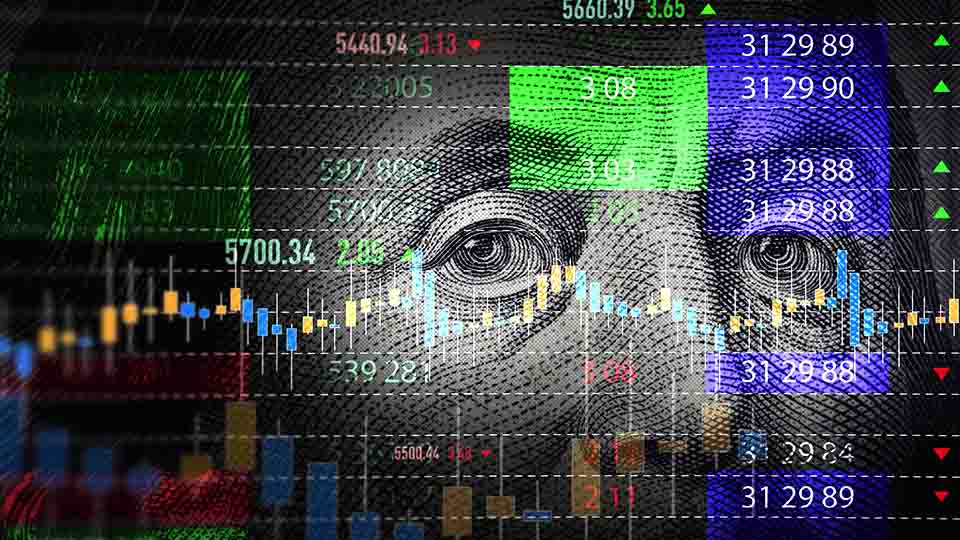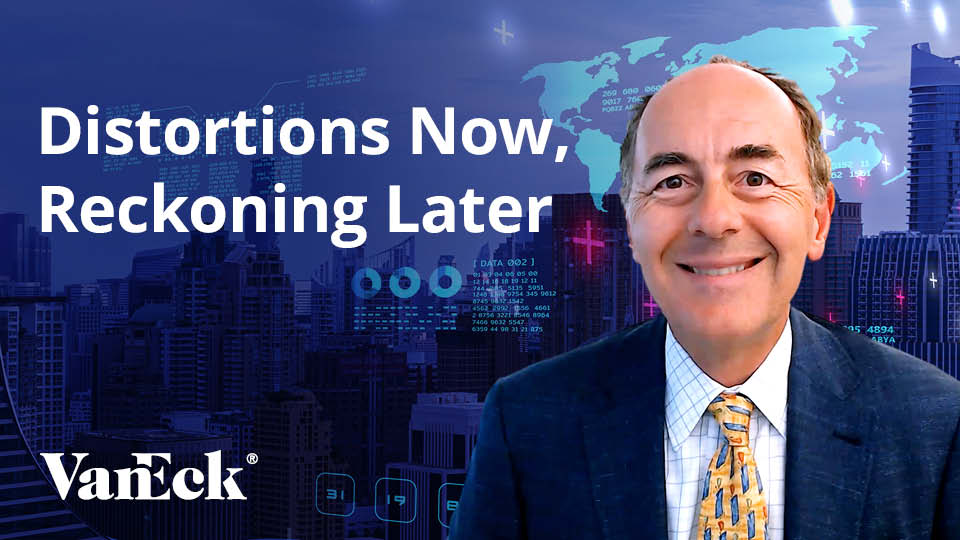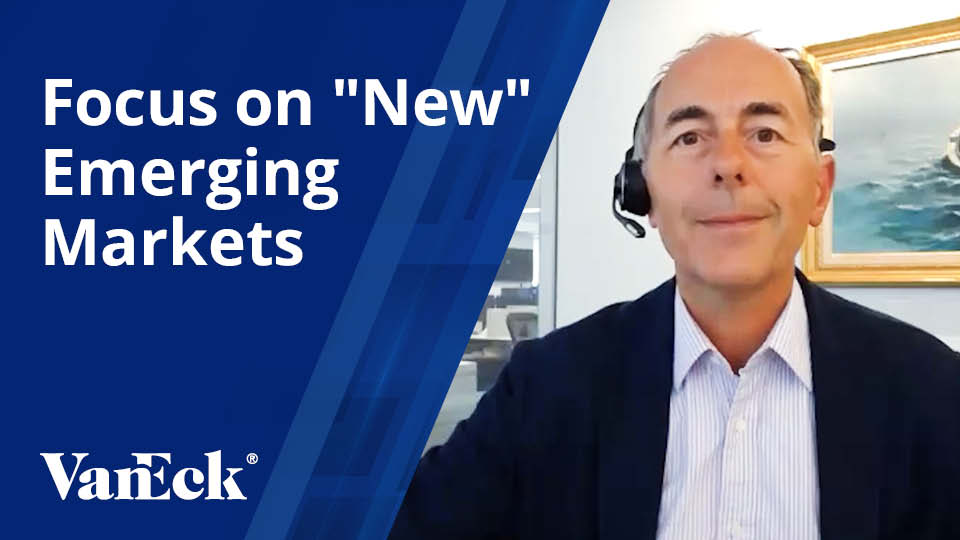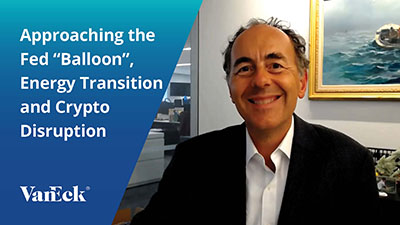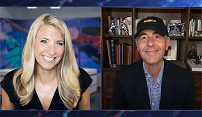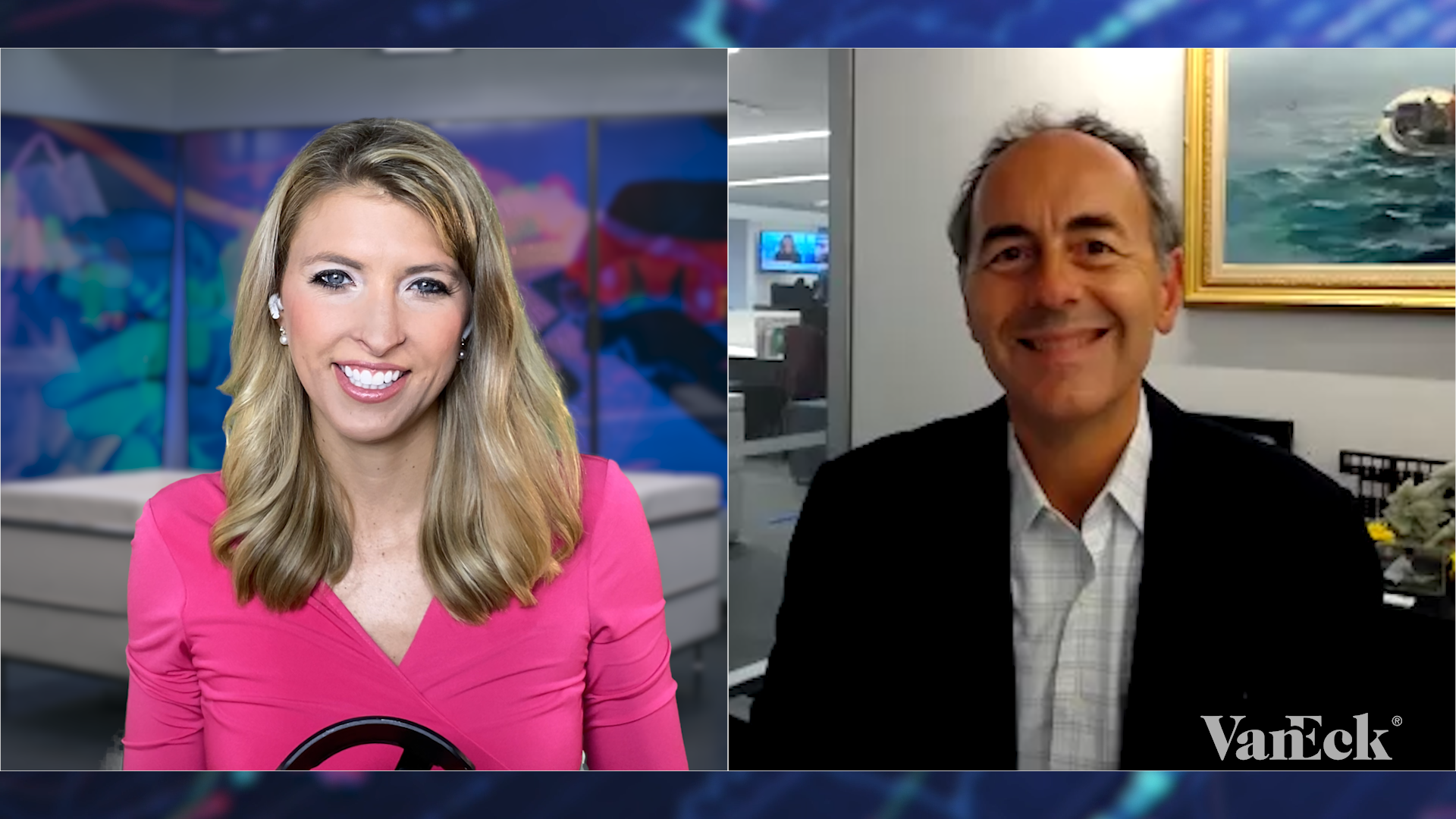2020 Investment Outlook: The World’s Next Big Digital Platform
09 December 2019
Watch Time 9:13
NATALIA GURUSHINA: Hello and welcome, I'm Natalia Gurushina, economist at VanEck, and I'm joined today by the company's chief executive officer, Jan van Eck, to talk about his ideas, market recommendations for the next few months. And Jan, traditionally, the first question is the easiest one, what's your outlook for the U.S. financial markets?
JAN VAN ECK: Well, Natalia, good to be here. Looking into 2020 I'd like to say our base case is not something investors want to hear. It's something that they might be uncomfortable with. But it's, don't worry, be happy. Because really there’s one simple music that's been playing for the last decade, which is, slow to moderate economic growth in the developed world and central banks easing and supporting the economies. And that's been fantastic for investors, again, in 2019. It was a ripping year. It may feel odd, but when you have this much central bank support, investors should be invested. That's basically our base case.
GURUSHINA: Good. So one country where there is something interesting happening almost on a daily basis is China. So, I'm curious. What's your outlook for China in the circumstances? Has something changed?
VAN ECK: Well, one of the key things that we said last year was, don't fight the PBoC [People’s Bank of China]. That was our theme coming into this year. And we were right because we said, listen, China was dealing with their debt bubble, but they were also dealing with it in a very balanced and very attentive way. And that may be a multi-year trend, but we didn't think that they were going to crash their economy. And that turned out to be correct. And if China is moving forward, even though the manufacturing sector is having trouble, that's still good news for the world. So that supports my view.
Now, what could change, although it may be unlikely, is what happens if there's a growth surprise, right? Usually when you're dealing with a debt bubble, it's not the “funnest” experience, to quote Ray Dalio. But, boy, if you had a growth surprise in China, I think the markets are offsides for that and they wouldn't be expecting a growth spurt globally. And that would help financial markets jump higher, commodity markets would jump higher, the dollar would probably weaken a little bit. So that would be an upside surprise.
GURUSHINA: Yeah. And it's not just an upside surprise per se, it's potentially a better structure of growth because it looks like China is actually going through some pain and perhaps not easing as much, and actually doing and changing something structurally, which I think is a good development. So, China is one potential surprise, are there any other surprises to look for?
VAN ECK: Well, I mean, if the central banks changed their policies, and the U.S., that would be a surprise. So, if the Fed [U.S. Federal Reserve] suddenly became hawkish... Throw out everything I just said because really the central bank does drive the market. But I doubt that would happen in an election year. But that's something to look at. The second central bank surprise to the negative is, if the European central bank can't be taken as a credible counterweight to slower growth. And that's what we talked about last quarter, which is why I think investors should have some kind of gold positioning or some hedge in the portfolio in the event that central bank confidence weakens dramatically.
GURUSHINA: Yeah. And since you mentioned the election year, the question is... Okay, it's election year in the U.S. Investors are naturally a little bit nervous, concerned about potential volatility. So do you have any specific portfolio recommendations for this year?
VAN ECK: Right, well I said at the beginning, this is uncomfortable, stay invested. Investors don't like it. And they didn't do this in 2019, right? It was a risk off year. More flows into fixed income than into equities. Look, I understand the concern about volatility, which can either come from the election cycle in the U.S. or also valuations are high for equities. I mean there's no doubt about it. And that leads many people to, therefore, be cautious. But valuation is the most unreliable, misunderstood indicator for how financial markets might behave. In the long term it's right. In the short term, it's completely misleading.
So, how do we suggest investors deal with volatility? The way we deal with it, in what I would call are smart beta ETFs, is the way we designed some of the ETFs, like our U.S. equity moat strategy, is by including stocks or components in those ETFs that aren't themselves overpriced, because you find pockets of the markets that are overpriced and if you can take those out of your index, when they get rebalanced on a quarterly basis, that's been our approach and that approach has worked this year. So that's our favorite approach, I guess I would say, in dealing with volatility. It’s not to be overcautious at a portfolio construction level, but to make sure that the individual strategies you're investing in make sense.
GURUSHINA: Jan, there's been a lot of interesting developments in 2019, a lot of upheavals, a wave of populism sweeping whole countries and even continents. What do you think is the most interesting or investible trend going into 2020?
VAN ECK: Yeah. Well, I'm really focused on the fact that we live in a world where we live and spend a lot of time on technology, social media platforms. And we've seen how if, for example in the U.S., Amazon has built an incredible franchise over the last decade. In China we've seen the emergence of Alibaba and Tencent, also in a very competitive market, but they're very dominant and they've built ecosystems around that. And we now have a third, what I would say, a third platform emerging, which I think is really interesting, and that's in India. And it's basically on the back of mobile phone price accessibility, so the prices have come down a lot. And the number of users is going from about a hundred million to over a billion in a very short time span. So that's very interesting. And I think our emerging markets equity investors, people that are happy that they were Alibaba and Tencent shareholders, should be looking at India as another investible trend. It doesn't get a lot of headlines, but I think it's very interesting from a growth perspective.
GURUSHINA: Yeah. And policy-wise, of course, there's been a lot of interesting policy initiatives, which have been a little bit more supportive of equity investment there. So Jan, looking at the asset management business that you run, what's the most important thing on your mind right now?
VAN ECK: Well, it's a little bit related and it's basically scale, scale, scale. The U.S. economy has never been, industry sectors have never been, as concentrated. Fewer companies have bigger market share. And in asset management that scale is leading to price competition. We see that amongst custodian banks just over the last couple of months we've seen this price cutting for online broker dealers. But it's also behind the scenes been a big trend in asset management.
So, what's the takeaway? Each company has to have a unique selling proposition that's different from scale or price. You know, at VanEck we try to come up with interesting investment strategies that are very thoughtful and appropriate to the asset class and meet investor needs. When I look at financial advisors themselves, they have to kind of move beyond portfolio construction, which is important for clients, but most of them are also looking at other ways of other value added services, whether it's tax related advice, estate advice, healthcare advice, other types of advice. Because you have to be unique and you have to differentiate yourself. You can't just offer the same bundle of funds.
So I find that trend to be continuing. And related to it is, which I find in my day to day life is, there's all these new technologies or software, I'm not so worried about AI [Artificial Intelligence]. And each of us has to learn those new software systems and apply them at work. Whether you do in your home life is a separate matter. I think a lot of us do it, but at work it's just exhausting to a certain extent. Learn the new software systems. What are the capabilities? It makes your life easier, but you have to use it to be more productive. It's kind of an annual challenge for us.
GURUSHINA: Cannot agree more, and thank you so much for fascinating insights. And thank you for tuning in. For more information and insights from VanEck experts, please visit us at vaneck.com, thank you.
Related Insights
01 September 2023
09 September 2021
